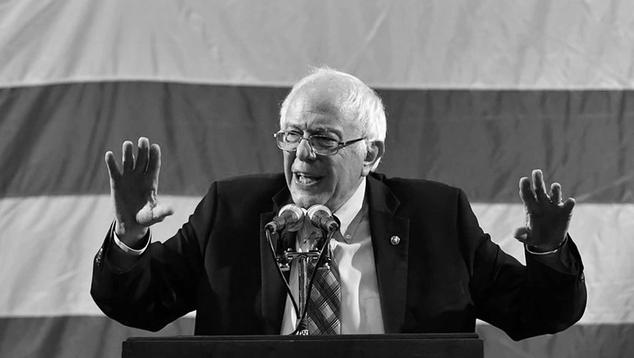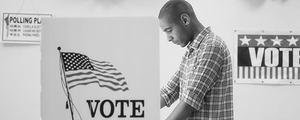Sen. Bernie Sanders, for the moment the front-runner in the race for the Democratic presidential nomination, has built his campaign on the idea that the U.S. government should provide all Americans with many of the basic necessities of life.
What do those necessities include? Healthcare, of course. "Medicare for all" has been Sanders' persistent and dominant campaign theme, in many ways the raison d'etre of his presidential quest. As Sanders says, the United States should "guarantee healthcare to all people as a right."
But Sanders' philosophical conviction that the government should be responsible for providing the basics of life extends well beyond healthcare. A glance at the Sanders campaign website shows his proposals that the government guarantee:
- Medicare for all
- Jobs for all
- Housing for all
- College for all
- Justice and safety for all
- Fair banking for all
- High-speed internet for all
These "for alls" are reminiscent of the bottom floors of psychologist Abraham Maslow's famous "hierarchy of needs" pyramid, including "physiological needs" (food, water, shelter, clothing) and "safety needs" (security, employment, health, shelter). Maslow argued that these needs must be met before humans can move up to fulfill higher needs such as love, belonging, self-esteem and self-actualization.
Sanders joins Maslow in agreeing that these needs must be fulfilled as basic life necessities, but goes further by arguing it is the responsibility of society as a whole -- as embodied in society's government -- to provide for these needs if people can't do so on their own.
What follows are six questions and answers about Sanders' broad concept of government's role in meeting the basic needs of the public.
1. Is Sanders Alone in Advocating That the Government Provide Basic Need Fulfillment for All?
The general idea that society owes its members a commitment to meet their basic needs is certainly not unique to Sanders.
A prime example is provided by erstwhile presidential candidate Andrew Yang's proposed universal basic income of $1,000 a month for every American adult over the age of 18. As Yang argued, his "Freedom Dividend" would "enable all Americans to pay their bills, educate themselves, start businesses, be more creative, stay healthy, relocate for work, spend time with their children, take care of loved ones and have a real stake in the future."
The underlying philosophy behind Yang's and Sanders' proposals are similar, I would argue: a commitment to providing a basic necessities "floor" for all Americans. Sanders would have the government provide these necessities one by one; Yang would have the government provide direct income that residents themselves can spend on necessities.
Other presidential candidates don't go as far as Sanders in terms of a direct and simple promise that government provide healthcare, housing, education and jobs "for all," but most address the concept in more nuanced and complex ways.
Pete Buttigieg, for example, endorses Medicare for all but would allow workers to keep their existing plans. The former South Bend mayor also proposes "lower costs" for healthcare, college, childcare and housing through public regulations and other means. Sen. Amy Klobuchar supports a healthcare plan that provides, but does not mandate, a public option, and supports housing vouchers (instead of "housing for all"), free one- and two-year community college (but not "college for all"), and changes in work laws and regulations (but not "jobs for all").
Former Vice President Joe Biden and Sen. Elizabeth Warren, along these same lines, each have their own plans for shoring up the necessities floor for Americans, but both stop short of advocating such benefits for all.
2. Is the Basic Concept of Government Involvement in Providing for All Americans New?
The basic concept of the government pooling resources and using them to provide all Americans an economic "floor" is most certainly not new. Facing the ravages of the Great Depression, Franklin Roosevelt's presidential administration instituted programs focused on providing U.S. residents with a number of basic necessities. These programs included Social Security, along with the WPA and CCC programs that created thousands of direct government jobs, unemployment insurance and federal agricultural assistance.
Sen. George McGovern, the 1972 Democratic presidential nominee, preceded Yang by some 47 years in proposing that every American be given $1,000 a year in basic income, a lot more money in 1972 than is the case now, because of inflation. (McGovern went on to lose every state except Massachusetts and the District of Columbia to Richard Nixon, but Nixon himself had flirted with a related concept in the form of a "negative income tax.")
And the idea of a basic income floor for every American has recently crept into Silicon Valley discourse, with tech moguls like Mark Zuckerberg discussing the idea as a remedy for the potentially devastating impact of technology, artificial intelligence and robots on Americans' jobs (the same rationale used by Yang).
3. Doesn't the U.S. Government Already Provide Many of These Types of Needs?
The idea of pooling income through taxes to provide basic necessities for those who need them is already in many ways an active part of U.S. (and, in some instances, local) government policy. All K-12 children in the U.S. receive free public education, based on pooled money that comes from all, not just from families with children in school. Healthcare is provided to all Americans aged 65 and older, based on pooled money from all workers. Income is provided to older Americans who have worked previously, based on pooled money from those still in the workforce.
Billions more in government money is spent each year to meet other basic Maslovian needs. As one recent review put it: "Today, the means-tested welfare system [in the U.S.] consists of 79 government programs that offer cash, food, social services, education, training and housing for low-income Americans."
4. What Is the Proposed Source of Money to Fund the Provision of Basic Necessities?
By definition, pooling money and redistributing it means taking money from those who have a lot of it and giving it in some fashion to those who have less. Sanders has proposed a wealth tax, increased estate taxes, higher payroll taxes, higher income taxes on upper-income earners and higher corporate taxes as the sources for the money to pay for his provision of necessities for all. (Sanders also says that some of the programs will pay for themselves through a shifting of current costs and cost savings.)
Yang proposed paying for his universal basic income by redirecting current welfare spending, creating a value-added tax on goods and services, increasing taxes paid by high-income earners, a new carbon fee, and by presumed growth in the overall economy.
Warren, for her part, has proposed to pay for her proposals with an "Ultra-Millionaire" tax on individuals with a net worth above $50 million, along with increased taxes on Social Security for the wealthy, a capital gains tax increase, and a rollback on the tax-cut bill signed into law in 2017.
5. How Does All of This Fit With American Public Opinion?
Americans are used to a progressive income tax system, of course, but there remain questions about how well an acceleration of this type of redistributive policy will fit with public opinion.
As I reviewed last year, Americans generally support government efforts to reduce poverty, increase minimum wages and efforts to expand who is eligible for overtime pay. And the public generally favors higher taxes on the rich, with most polls showing support for some type of wealth tax. But there are limits. Some polls show pushback when the hypothetical tax rates reach levels as high as 70%. And many Americans clearly like the idea of having a rich class -- if only because many want to be rich themselves.
Beyond these attitudes toward the concept of extracting more money from the rich, what do we know about Americans' views of the concept of their government providing all of the country's residents with core, basic necessities? My conclusion: the American public is far from sold on this idea if implemented across the board, but there is evidence of support for some of the component ideas.
-
Gallup research shows mixed reaction to the idea of a universal basic income program as a way to "help Americans who lose their jobs because of advances in artificial intelligence," a rather narrow definition of the broader "floor" concept. Our latest update in fact shows a tilt to the negative compared with previous measurements.
Other surveys attempting to measure the concept of a universal basic income also produce mixed results, in part based on how the idea is explained to respondents. A Pew Research survey from a few years ago found majority support for the idea of a government basic income in a situation in which robots and AI are able to do a lot of the jobs humans used to do.
But an NPR/PBS NewsHour/Marist Poll last summer asked, "Do you think a universal basic income of $1,000 per month for each American 18 or older is a good idea or a bad idea?" and found only 26% agreeing that it was a good idea. -
I reviewed the complexities surrounding the idea of "healthcare for all" last year, and concluded then that "Americans do not dismiss the idea of major healthcare reform out of hand."
Along these lines, Gallup's annual Mood of the Nation survey in January of this year found a majority dissatisfied with the availability of affordable healthcare. But while Gallup has shown that a majority of Americans agree with the concept that government needs to make sure everyone has healthcare, less than half favor a government-run healthcare system.
Kaiser Family Foundation has done more survey research on the idea of Medicare for all than anyone else. Their research, like Gallup's, finds majority support for the government "doing more to help provide health insurance for more Americans." In their most recent survey, Kaiser also found majority support (56%) for Medicare for all (although support for the latter falls when it is pointed out that this would mean no option to keep existing insurance).
Other surveys find somewhat less-than majority support for the idea of Medicare for all, underscoring the elastic nature of public opinion on the topic. -
An NPR/PBS NewsHour/Marist poll last July showed 53% of Americans saying that "free college tuition at public colleges or universities" is a good idea. But a Gallup question several years ago asked about making "tuition free at all public colleges and universities throughout America" and found slightly lower support, with 47% agreement and 45% disagreement.
More generally, Gallup polling last September showed that two-thirds of Americans tilt toward the view that government should have more responsibility for making certain that all Americans have adequate healthcare, and that all Americans who want jobs have them. But separate Gallup research shows Americans prefer that the "free market" rather than government be primarily responsible for such things as the economy overall, wages, higher education and healthcare -- preferring the government only for protecting online privacy and protecting the environment.
6. What Does the Focus on Providing a Floor for Basic Needs Ignore?
Sanders' plans for the government providing basic needs for all Americans addresses an area of major concern for any social system: meeting basic maintenance needs by keeping the people within that system alive and able to function. Sanders also argues that his proposals address issues of fairness and equity.
But there is a whole other set of social system needs not addressed by this concern about a floor on basic needs: the need to keep the system viable in its broader environment by adapting to changes and challenges it faces, while meeting overall system goals. Redistributing resources internally will mean little going forward if the big challenges facing our society are neglected.
Historian Yuval Harari, author of the book Sapiens (which has sold 12 million copies worldwide), says there are three major challenges facing the world going forward: nuclear war, ecological collapse and technological disruption -- and that all other societal challenges pale in comparison.
Thus Sanders -- or any other candidate who aspires to be U.S. president in 2021 -- will have to balance multiple objectives simultaneously if they are to succeed. Finding the right mix of an emphasis on government redistributing resources internally with the need to focus resources on external challenges is going to define the nation's ability to survive and flourish going forward.




